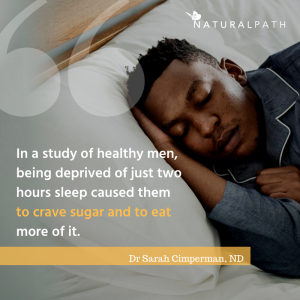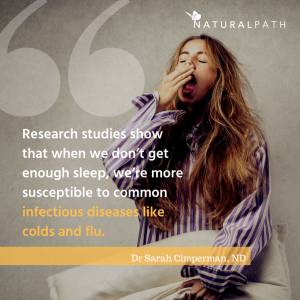The holiday season can be a busy and stressful time. Some of the stress is good for us—like spending time with family and friends—but much of it is unpleasant and unavoidable—like jet lag and unexpected travel delays. We can’t avoid holiday stress completely but we can minimize its effects by maintaining healthy habits all year long. After all, what we do on a regular basis has a greater impact on our overall wellbeing than what we do once in awhile.
Follow these five guidelines to make this your healthiest holiday season yet
#1 | Get eight hours of sleep each night.
 Most adults need about eight hours of sleep each night, especially in the winter when the nights are naturally longer. While we sleep and when we are surrounded by darkness, the pineal gland in the brain secretes melatonin, a hormone that helps regulate our circadian rhythm. It’s well known as a sleep hormone but melatonin also plays an important role in immunity, helping to regulate the development and function of the white blood cells that defend our bodies against disease. Research studies show that when we don’t get enough sleep, we’re more susceptible to common infectious diseases like colds and flu.
Most adults need about eight hours of sleep each night, especially in the winter when the nights are naturally longer. While we sleep and when we are surrounded by darkness, the pineal gland in the brain secretes melatonin, a hormone that helps regulate our circadian rhythm. It’s well known as a sleep hormone but melatonin also plays an important role in immunity, helping to regulate the development and function of the white blood cells that defend our bodies against disease. Research studies show that when we don’t get enough sleep, we’re more susceptible to common infectious diseases like colds and flu.
We’re also more likely to binge and overeat when we’re sleep deprived. Short sleep cycles cause levels of leptin, a hormone that suppresses appetite, to go down, and levels of ghrelin, a hormone that stimulates hunger, to go up. In one study of healthy men, being deprived of just two hours sleep caused them to crave sugar and to eat more of it. Overindulgence in sweet foods and drinks is a common cause of unwanted weight gain during the holiday season, and lack of sleep is a common contributing factor.
Minimize these risks by sleeping in complete darkness for eight hours each night. If holiday travel will disrupt your sleep schedule or bring you to a new time zone, avoid napping on the day you arrive. Stay awake in your new location until after sunset to let the natural light re-calibrate your internal clock. The morning after you arrive, wake up as close to sunrise as possible and spend at least fifteen minutes exposing some of your skin to the early-morning sunlight. If you still have difficulty sleeping, consider a melatonin supplement. Talk to your doctor about the best dosage for you and ask about potential interactions with any medications or supplements you may be taking.
#2 | Exercise regularly.
Regular physical activity improves our quality of sleep as well as our energy levels, mood, and the body’s ability to handle holiday stress. Exercise also improves cardiovascular health, strengthens bones and muscles, boosts mitochondrial function, releases feel-good compounds called endorphins, and even fights premature aging.
Maintain as much of your regular physical activity as you can during the holidays and make adjustments when necessary. Exercise doesn’t have to happen at the gym. Walking, carrying packages, and running errands can count too, as long as your heart rate goes up and you are on your feet for at least 30 minutes. If you will be traveling for the holidays, don’t forget to pack your walking shoes and a jump rope or some resistance bands so you can exercise whenever and wherever the opportunity arises. If you’re not already physically active, talk to your doctor before you begin.
#3 | Eat your vegetables.
Vegetables are full of the vitamins, minerals, antioxidants, and fiber we need to stay healthy. They should always make up about half of every meal, even during the holidays. At special meals, sample sweet and starchy foods in small portions to make room on your plate for vegetables and protein. Derive pleasure from savoring the flavor and texture of every bite, not from consuming a large amount of food. Finish meals feeling satiated rather than stuffed. When you fill up on veggies, chew your food thoroughly, and take time to enjoy meals, you will be less likely to overeat.
#4 | Practice relaxation.
 During periods of stress, it’s only natural for levels of stress hormones to go up. If they are elevated for a prolonged period of time, they can trigger inflammation, prompt the body to accumulate fat, increase the risk of developing chronic diseases like diabetes, and deplete serotonin, a neurotransmitter that helps regulate appetite and mood. When levels of serotonin are low, we crave sweet and starchy foods, and we’re more likely to binge or overeat. Low levels of serotonin can also cause depression and anxiety, which makes coping with holiday stress even more challenging.
During periods of stress, it’s only natural for levels of stress hormones to go up. If they are elevated for a prolonged period of time, they can trigger inflammation, prompt the body to accumulate fat, increase the risk of developing chronic diseases like diabetes, and deplete serotonin, a neurotransmitter that helps regulate appetite and mood. When levels of serotonin are low, we crave sweet and starchy foods, and we’re more likely to binge or overeat. Low levels of serotonin can also cause depression and anxiety, which makes coping with holiday stress even more challenging.
One of the best ways to keep levels of stress hormones low is to practice relaxation. There are many ways to do it: yoga, meditation, breathing exercises, guided imagery, progressive muscle relaxation, self-hypnosis, qigong, or simply spending time in nature. Find what resonates with you and practice it daily or whenever the need arises. If relaxation doesn’t come naturally to you, don’t worry. It’s a skill and you can learn to do it well. Like any skill, relaxation requires practice, focus, and concentration. The more you do it, the easier it will be.
#5 | Keep Rescue Remedy on hand.
Rescue Remedy is a homeopathic dilution of flower essences. It’s formulated to help manage acute stress and can be taken as needed. Rescue Remedy is safe, well-tolerated and available in most health food and supplement stores. It will not interact with supplements or pharmaceutical medications, but it may interfere with other homeopathic remedies. If you’re already taking a homeopathic remedy, talk to your doctor before taking Rescue Remedy.
References:
Orzech KM, Acebo C, Seifer R, Barker D, and Carskadon MA. Sleep patterns are associated with common illness in adolescents. Journal of Sleep Research. 2014;23(2):133-142 https://onlinelibrary.wiley.com/doi/full/10.1111/jsr.12096
Van Cauter E, Holmback U, Knutson K, Leproult R, Miller A, et al. Impact of sleep and sleep loss on neuroendocrine and metabolic function. Hormone Research. 2007;67(Suppl 1):2–9. https://www.ncbi.nlm.nih.gov/pubmed/17308390
Huebschmann AG, Kohrt WM, and Regensteiner JG. exercise attenuates the premature cardiovascular aging effects of type 2 diabetes mellitus. Vascular Medicine. 2011;16(5):378–90. https://www.ncbi.nlm.nih.gov/pubmed/21893560
Godfrey KM, Inskip HM, and Hanson MA. The long-term effects of prenatal development on growth and metabolism. Seminars in Reproductive Medicine. 2011;29(3):257–65. https://www.ncbi.nlm.nih.gov/pubmed/21769765
 Sarah Cimperman, ND is the author of the new book, The Prediabetes Detox: A Whole-Body Program to Balance Your Blood Sugar, Increase Energy, and Reduce Sugar Cravings. She graduated from NCNM in 2002 and has a private practice in New York City. Her expertise has been featured on Fox News and Huffington Post and in Natural Health magazine, Whole Living magazine, and the Well Being Journal, among other publications. Dr. Cimperman also writes two blogs, A Different Kind Of Doctor and The Naturopathic Gourmet.
Sarah Cimperman, ND is the author of the new book, The Prediabetes Detox: A Whole-Body Program to Balance Your Blood Sugar, Increase Energy, and Reduce Sugar Cravings. She graduated from NCNM in 2002 and has a private practice in New York City. Her expertise has been featured on Fox News and Huffington Post and in Natural Health magazine, Whole Living magazine, and the Well Being Journal, among other publications. Dr. Cimperman also writes two blogs, A Different Kind Of Doctor and The Naturopathic Gourmet.

















